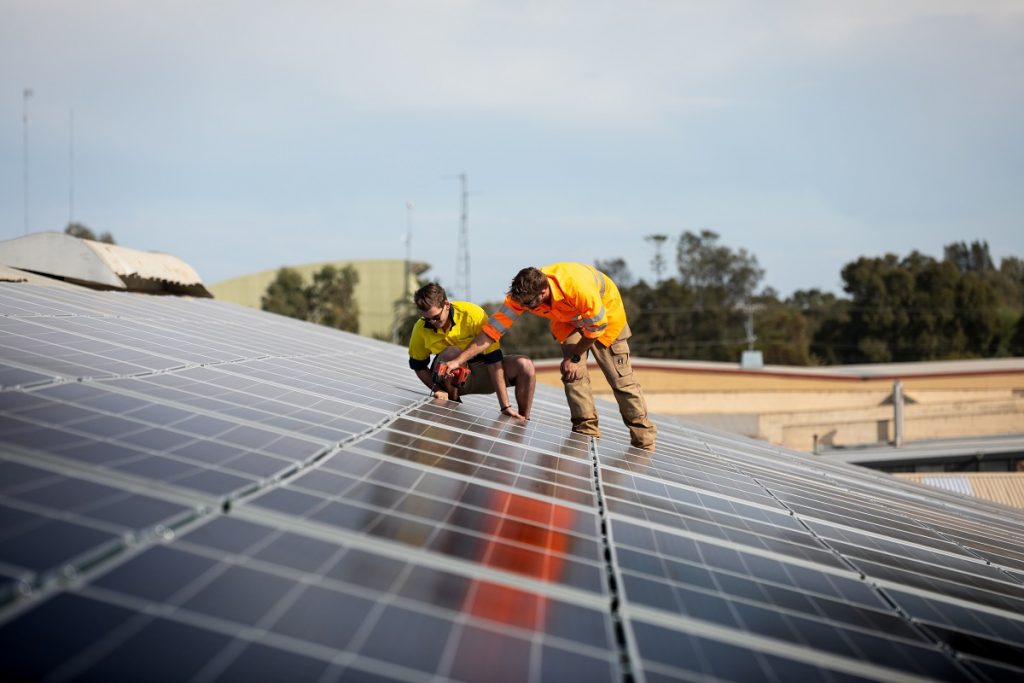Off-Grid Energy Australia

Off-Grid Energy Australia support people to go off-grid. Based in South Australia, they operate across SA, Victoria, Tasmania, WA, and NSW. Off-Grid Energy are one of Australia’s most experienced designers and installers of solar and battery storage systems. They design off-grid systems for homes and businesses, that provide renewable power to properties – without the need for the mains electrical grid. The majority of their off-grid systems are installed in rural and remote areas. An Off-Grid Energy power system helps to replace the need for diesel-powered generators or grid supplied power, reducing the amount of carbon released into the atmosphere by these sources. The amount of carbon reduction depends on system size, the type of fuel, and the installation location. Their systems also reduce, or in some cases eliminate, the need for the transportation of these fossil fuels to remote areas.
Off-Grid Energy also try to be as sustainable as possible in their office
- Utilizing natural light where possible
- Reducing air-conditioning and heating use by encouraging uniform flexibility
- Installation of an air ventilation system to improve air flow throughout the office
- Emphasis on using digital information over paper, and reducing printed paperwork
- Turning electronic items off at power supply after each day’s work
- Purchase of 100% green power
- Currently installing a 3.5kW solar system on their head office
- Separating bins for recycling of cans/bottles, scrap aluminium, scrap cable; and using a rubbish collection company that sorts and recycles what it collects
- Increasing insulation in office walls & ceiling to reduce heat/cool losses
Supporting Carbon Neutral
Off-Grid Energy is a very proud supporter of Carbon Neutral. Since 2012 they have purchased carbon offsets for all their installations to help reduce their impact on the environment.
Travel
The installation and distribution of the off-grid systems does require large distances to be travelled, so they try to minimise their travel footprint by:
– Grouping freight items to reduce transport frequency
– Installers sharing vehicle to get to site
– Phoning, emailing and video conferencing with suppliers and external offices
– Providing a flexible work environment to allow working from home or alternative locations
– Purchasing carbon offsets for any flights taken
Waste
The company are always trying to reduce the amount of waste they create and ensure that it is either reused or recycled prior to disposing into landfill. “If our clients are replacing old equipment, we recommend recycling in Australia via companies such as Reclaim PV (solar modules), Envirostream (Lithium-ion batteries), or local lead acid battery recycling depots” says Emily.

After many years running the off-grid department for Australia’s largest solar company, Emily says they knew that providing energy independence with battery storage systems was where there is the biggest impact. So, when the company closed its off-grid department to focus on the easier grid-connect solar market – their next step was clear. “We took our experience, our enthusiasm, the best wishes of our previous employer; and started Off-Grid Energy Australia” she says. Off-Grid Energy Australia was founded in 2011 by Hugh Driscoll and Sean LePoidevin – with Emily and Randal Love making up the founding team.
“Sustainability is at the core of both my personal and business lives. I try to make every decision with its environmental impact in mind – from the type of food I buy, to where I buy it from, how I travel, my home energy source (100% renewable of course!), and so on. I am lucky enough to be a fairly creative person, so I’m quite happy to repurpose or fix something – rather than buying something new to replace it” Emily shares.
Living a fully sustainable life in our current societal structure isn’t always an easy thing to achieve. Not everyone can ride their bike to work or has the ability to make drastic changes to their home to improve sustainability. But we should see every decision (no matter how small) as an opportunity to take the most sustainable route and celebrate every sustainable option chosen as a win.
To the team at Off-Grid Energy Australia, being a sustainable power provider means leading by example and reducing the business’s environmental footprint as much as possible. They are always striving to work smarter and more efficiently, which in turn improves environmental sustainability. Sustainable decision-making extends to every part of the business.
Off-Grid Energy Australia designs renewable power systems to provide clients with total energy independence. As part of the system design process, they undertake an energy audit (Load Demand Profile) of your home or business. The audit involves looking in detail at how and when you use energy. They are therefore in the unique and fortunate position to work closely with their clients to influence or change some of their energy choices at the same time – an important part of the picture. It is great to install alternative energy systems but we also have to change the way we consume energy.
Emily explains that this does not mean you have to compromise on lifestyle at all – rather it means making different choices. For example, purchasing appliances with better energy ratings, using passive solar design techniques instead of additional heating and cooling, changing your sewerage system to a composting one, or looking into other innovative technologies. “Whilst all these have great outcomes for the environment, they also save our client money because their system size is reduced. Win-win!” says Emily.
 Emily’s Tips for Creating a More Sustainable Home
Emily’s Tips for Creating a More Sustainable Home
Building a new home is the best time to have the most impact on the sustainability of your home.
Implementing simple concepts such as passive design, good insulation and natural lighting are great ways to reduce heating, cooling and lighting electricity demand whilst also improving comfort levels.
Not all of us have the option to start from scratch on our homes, but there are still things we can do to improve the sustainability of our homes.
Our top tips would be:
- Install solar! Whether you are on or off the grid, solar is a great decision.
- Heat water efficiently. Install a solar or electric heat pump hot water system.
- Choose your appliances wisely. When choosing new appliances, opt for the most energy rating stars, even though it could be more expensive up front, you will recover that cost over time.
- Consider using LEDs (light emitting diodes), which are much more efficient than other globes.
- Capture breezes for cross-ventilation. The best cross ventilation can be achieved by opening doors or windows on opposite sides of your home.
- Ceiling fans are a cost affective way of cooling.
- Also consider extended eves and verandas.
- By installing a shade structure (or planting some lovely trees!) on the western side, you can reduce heat intrusion.
- Insulation of your roof or ceiling, to ensure a pleasant temperature whatever the season.
- Draught-proof your windows and doors by fitting window seals or draught excluders which can be bought for little cost and ensure the heat is kept out and your air con is kept in.
- Heat and cool naturally using passive solar design principles. Good passive solar design will allow your home to naturally heat in winter and cool in summer – saving you energy and money.
- When building a new home look at your house orientation and room zoning. Make sure you have correctly oriented your home on the block to suit your region and group any utility rooms together to minimize the amount of heat lost from hot water piping.
You can find Off-Grid Energy Australia here
Helen

 Emily’s Tips for Creating a More Sustainable Home
Emily’s Tips for Creating a More Sustainable Home
Hi Helen,
Can you please tell me is it possible to give the power to waterpump for rainwater tanks?
Please suggest.
Thanks,
Ash
Hi Ash, I am sorry but I do not know, you would have to check with them
thanks, Helen